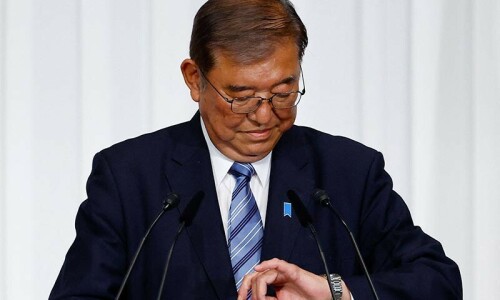TOKYO: On Monday, Japan’s Prime Minister Shigeru Ishiba pledged to remain in office despite his bet that snap elections would fail and leave his party without a majority for the first time since 2009.
After Ishiba took office on October 1, he called Sunday’s election, but voters punished his Liberal Democratic Party (LDP), which has ruled Japan almost continuously since 1955.
On Monday, the 67-year-old Ishiba stated that he would not tolerate a “political vacuum” in the fourth-largest economy in the world.
After the party scandal, which contributed to Fumio Kishida’s downfall, he stated that “people’s suspicion, mistrust, and anger” were the most important election factors. Ishiba stated to reporters, “I will implement fundamental reform regarding the issue of money and politics.”
The number of female lawmakers reaches a record high of 73, but they still make up less than 16 percent of the legislature. The yen fell more than 1% against the dollar, hitting a three-month low.
The LDP and its junior coalition partner Komeito missed Ishiba’s stated goal of winning 233 seats, or a majority in the 456-member lower house, according to projections made by the national broadcaster NHK and other media.
According to NHK’s results, the LDP won 191 seats, down from 259 at the previous election in 2021, and Komeito won 24. The official results had not yet been released.
Masakazu Ikeuchi, 44, a restaurant worker, said on Monday in rainy Tokyo, “As long as our own lives don’t improve, I think everyone has given up on the idea that we can expect anything from politicians.”
Minority government: Former premier Junichiro Koizumi’s son Shinjiro Koizumi, the LDP’s election committee chief, resigned on Monday to “take responsibility” for the outcome.
Analysts said that Ishiba’s next move is most likely to try to lead a minority government because the divided opposition probably can’t form a coalition of their own. Ishiba said on Monday that he was not thinking about forming a larger coalition “at this point,” and he has 30 days to do so.
Japan faces a variety of challenges, including a declining population and a tense regional security environment, and a minority government will likely slow down the parliamentary process. It could also encourage LDP members to challenge Ishiba for office.
According to Yu Uchiyama, a political science professor at the University of Tokyo, “lawmakers aligned with (former prime minister Shinzo) Abe were cold-shouldered under Ishiba, so they could potentially pounce on the opportunity to take their revenge.”
He added, “But at the same time, they might take the high road and support Ishiba for now, thinking it’s not the time for infighting,” despite the fact that the number of seats held by the LDP has decreased significantly.
Booted Out The opposition Constitutional Democratic Party (CDP) of former premier Yoshihiko Noda was a big winner because it increased its projected seat count from 96 at the last election to 148.
During the campaign, Noda attacked media reports that the LDP was funding district offices run by people involved in the slush fund scandal. Noda stated late on Sunday that “the LDP-Komeito administration cannot continue,” adding that “voters chose which party would be best suited to push for political reforms.”
A fringe party founded by an actor, Reiwa Shinsengumi, tripled its seats to nine after promising to abolish sales tax and increase pensions, mirroring elections elsewhere.
The conservative and anti-immigration Conservative Party of Japan, which Naoki Hyakuta, a nationalist writer, founded in 2023, won its first three seats. NHK reports that while the number of women lawmakers has reached a record high of 73, they still make up less than 16 percent of the legislature. Takako Sasaki, a 44-year-old voter, stated, “I think the outcome was a result of people across Japan wanting to change the current situation.”
Asian Nato Ishiba, another factor in Kishida’s unpopularity, stated prior to the election that he was planning a new stimulus package to alleviate the pain of rising prices. The military is another significant spending area; Kishida has pledged to double defense spending and strengthen US military ties as a countermeasure to China.
To combat China, Ishiba has supported the formation of a regional military alliance similar to NATO, albeit with the caveat that it would “not happen overnight.” “Constructive and stable China-Japan relationship that meets the requirements of the new era,” the Chinese foreign ministry stated on Monday.



